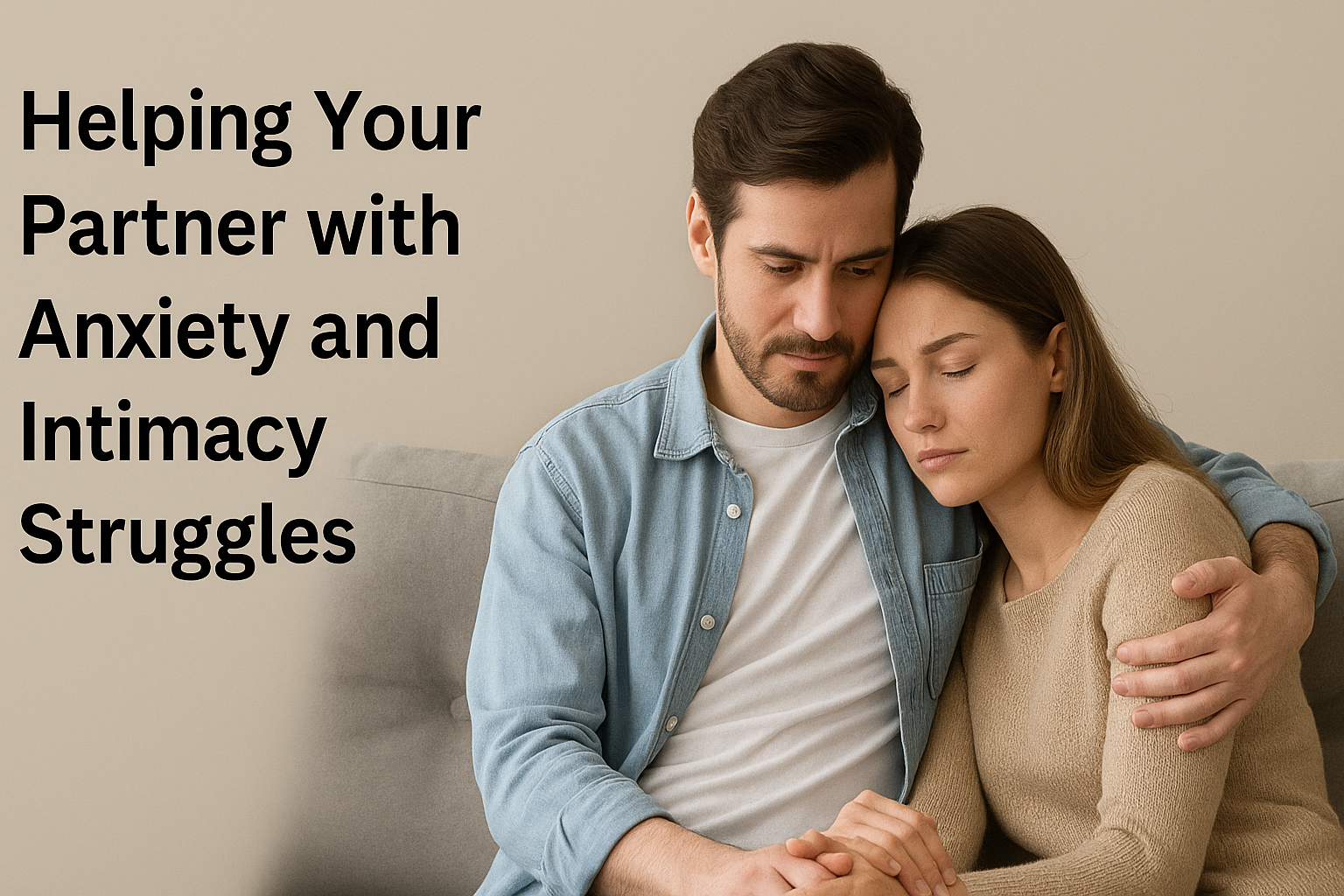
When someone you love struggles with anxiety, the effects can show up in many areas of your relationship. One of the most sensitive areas affected is intimacy. Some adults notice that stress, overthinking or emotional overwhelm often leads to emotional or physical distance. This creates confusion for both partners.
But it’s important to remember: anxiety is not a refusal to connect. It’s a signal of fear, insecurity or emotional overload. With patience and understanding, couples can rebuild intimacy in ways that feel safe and supportive for both.
Understanding the Link Between Anxiety and Intimacy

Anxiety changes how a person thinks, feels and reacts. For many adults, it leads to avoidance, hesitation or a loss of interest in physical closeness. This is not about love disappearing. Instead, the brain may be too busy scanning for danger or managing mental chaos to focus on closeness.
Adults may become more self-critical, doubt their attractiveness or worry about disappointing their partner. These thoughts reduce the comfort needed for intimacy.
In some cases, trauma or past experiences may also influence how someone responds to touch or emotional closeness. Creating safety is key.
Signs That Anxiety Is Affecting Your Intimacy

Some common signs include:
- Avoiding physical closeness even when love is present
- Overthinking after physical or emotional connection
- Feeling overwhelmed by romantic gestures
- Pulling away during intimate moments
- Sudden mood changes linked to closeness
These signs don’t always mean rejection. Many times they point to the inner struggle of wanting connection but fearing it at the same time.
Ways to Support Your Partner with Intimacy Issues

1. Start with Compassion, Not Pressure
The first step is not trying to “fix” the problem. Instead, listen. Show that you’re open to understanding their experience without pushing for more than they can give.
Avoid ultimatums or guilt-based words. Say things like, “I’m here for you” or “I want to understand what feels comfortable for you.”
2. Create Safe, Non-Sexual Touch
Sometimes, small forms of touch like holding hands, sitting side by side or casual cuddles help rebuild intimacy without pressure.
Let your partner set the pace. This comfort helps the nervous system calm down and allows connection to build naturally.
3. Explore Relaxation Together
Gentle activities like slow walks, guided breathing or scent-based rituals create calming energy. Some adults prefer soothing environments enhanced by light touches of scent.
Pheromone perfumes can be explored in this setting—not for direct stimulation but to add comfort or warmth to shared moments.
These natural body-signal scents have been studied for their role in human bonding and may create a subtle sense of closeness. Adults often explore them not for seduction but for emotional connection.
4. Use Words That Reassure
Anxiety brings self-doubt. Saying things like “You’re enough” or “We’re in this together” helps your partner feel safe. Emotional reassurance helps rebuild intimacy from the inside out.
Let them know that love and closeness are not based on performance but on shared presence.
5. Respect Boundaries Without Making It Personal
If your partner needs space, respect it. Avoid making assumptions. Adults with anxiety often need extra time to feel safe.
Let them know you’re not going anywhere. Stay emotionally available without pressing. This gives them the freedom to return to intimacy when they feel ready.
6. Consider Shared Counseling or Support Tools
If the challenge continues, a couples therapist can help both partners explore the emotional patterns involved. Therapy offers tools to improve communication and rebuild intimacy at a comfortable pace.
Mental health apps, relationship guides or quiet journaling sessions together can also help.
When to Focus on Your Own Needs

Helping someone with anxiety does not mean ignoring yourself. Your needs for connection, closeness and care also matter.
Speak openly about what you feel without blaming. Use words like “I miss feeling close to you” instead of “You never want to be near me.”
This invites understanding, not defense. It also keeps intimacy a shared goal instead of a personal struggle.
Rebuilding Intimacy Takes Time

There’s no fast way to rebuild intimacy when anxiety is involved. The brain and body need time to relearn safety. Patience becomes your strongest ally.
Use simple daily rituals—kind words, shared laughs, small acts of care—to keep the bond alive. Intimacy is not just physical. It’s also the feeling of being seen and accepted.
Some adults prefer subtle emotional tools like calming touch, shared breathwork or even gentle background scents from pheromone perfumes to ease tension and improve emotional comfort. These tools aren’t cures but quiet helpers in creating connection.

Final Thoughts
Anxiety and intimacy struggles are real. But they do not mean the relationship is broken. With gentle effort, listening and emotional patience, couples can move through these struggles and find deeper connection.
Remember, you’re not alone. Many adults face these issues and come out stronger—together.
FAQs
1. What is intimacy in a relationship?
Intimacy is the emotional and physical closeness shared between partners. It includes touch, trust, and open communication.
2. How does anxiety affect intimacy?
Anxiety often causes overthinking or emotional overwhelm, making it harder to feel safe during close moments.
3. Can pheromone perfumes help with intimacy?
Some adults explore pheromone perfumes as a gentle aid to emotional comfort and bonding, but not as direct solutions.
4. Should I talk to my partner about their anxiety?
Yes, in a gentle and non-judgmental way. Create a space where they feel heard without pressure.
5. How can I rebuild intimacy with my anxious partner?
Start with small gestures, respect boundaries and use daily emotional support like affirmations or shared rituals.
6. Are there ways to connect without physical touch?
Yes. Emotional closeness, shared laughter or even scent-based rituals like pheromone perfumes may create a sense of comfort.
7. Can anxiety ruin a relationship?
It can create distance, but with care and understanding, couples can often work through it and grow closer.
8. Should I encourage therapy?
If it feels right, suggest it as a shared journey. Many couples find therapy helpful for building communication and intimacy.
9. What should I avoid saying to my anxious partner?
Avoid blaming or using phrases like “You never…” Focus on what you feel and need gently.
10. Can intimacy return after emotional distance?
Yes. With time, support and effort from both sides, intimacy often returns stronger than before

